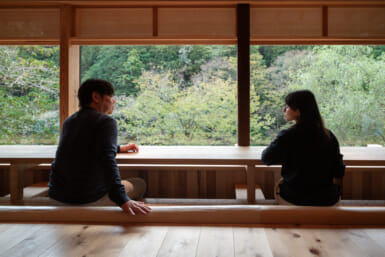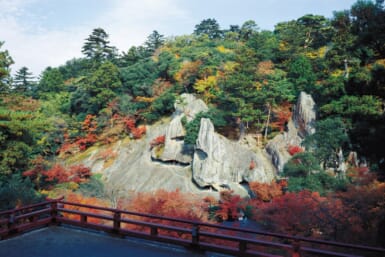I am looking down on an expressway that runs in front of the building where I live. It is 3 in the morning. I am in between shifts at my desk, stretching my limbs. I have an aerial view of the urban landscape from my high floor.
All of a sudden a small truck, a maintenance vehicle, comes into sight on the expressway below. It is moving very slowly. It has a flat, open back. A man—he wears a uniform of sorts— runs behind the truck. He is picking up traffic beacons or the like—I cannot see exactly what they are—and he is placing them on the back of the truck, one by one.
This slowly moving panorama continues across my field of vision. The man keeps running. Sometimes he doubles back, when he gets ahead of the truck. Sometimes, he falls behind and puts on a burst of speed to catch up. He is putting a lot of energy into his work. Then it dawns on me. It is the middle of the night. This man is running at his work, all alone out there on the expressway, while his mate drives. Wait a moment! Gin this be real?
But yes. This is a country where people still run at work at whatever time of day or night. It is completely mind-boggling.
Of course, we all work. Just now, I am starting into a project. It involves contacting 100 Japanese small and medium-sized enterprises. They are the subject of a report I am preparing, with the help of others, for The Economist Conferences-Japan. The report is to be presented at two Tokyo conferences scheduled by my friend Dr. David Satterwhite of The Economist group for Apr. 19 and Oct 3—and dedicated to the topic of entrepreneurship in Japan.
That is what I am doing at 3 am. I am writing up my notes on calls I made yesterday—I spoke to a company down in Aichi Prefecture that makes things called printed circuit boards. I have been deciphering— with assistance from Dennis Yang, one of our small team working on the project—an e-mail transmission in Japanese of a newspaper article reporting a speech made by the shacho of the firm. I like to write at night.
But this is nothing, compared to running on an expressway at night with traffic barrelling past your shoulder. I didn’t mention that. The thoroughfare in question is in use. The traffic never stops.
This is how Japan stays in business—as the workshop of the world. This country has, by the way, now overtaken America, a 20th-century industrial power, to become the world’s Numero Uno in manufacturing. This is according to Eamonn Fingleton, writing in the International Herald Tribune. I am an admirer of his book In Praise of Hard Industries, published by Houghton Mifflin in 1999. The subtitle is: “Why Manufacturing, Not the Information Economy, is the Key to Future Prosperity.”
That is good.
It may in fact be time for some of us, who believe that Japan is something to write home about, to write home. I am impressed by the outfits I am reporting on. Just consider. In this country, you can call a company late—say after 6:30 or 7 p.m.—and still find the people in charge of press relations on the job. I like that. It shows seriousness.
I meet kindred spirits. Only yesterday I sat next to someone at lunch, an investment officer at a Western company, who mentioned that he “visits 250 companies a year.” These are indeed stirring times in Japan.
Not all is for the best—to put it mildly. Deflation is taking its toll here, finally. The stock market is down. Companies are caught with portfolios of securities they can’t sell. The banks are calling in loans. Bankruptcies are surging. A financial crisis is in the offing and Japanese leaders are disturbed. Mr. Hiroshi Okuda, the chairman of Toyota Motor, has publicly predicted the collapse of the banking system in March. Ah well, let the banks here be put out of their agonies, some are saying. Let them be nationalized, a contributor to The Financial Times—Graham Turner of GFC Economics—proposed in a column.
The paper ran the piece under a subhead stating that “economic meltdown will require temporary nationalization of the country’s banks.” That sounds ghastly. Experts shrug. The banks are “nationalized” already to the extent that the government guarantees all deposits in the land.
Life is not over for the hurrying man. In fact my sense is that it is only just beginning—for many of the small cap companies I run into. So by all means watch the Weekender for updates every month.
Meanwhile, I note the obvious. Work is a religion in this country. I remember my shock, when I first came here in the 1960s… On my first or second day at the wheel of a car I pulled into a gas station—a “garage” in England. A handful of young men in uniform hared across the forecourt to serve me.
As they did so, they let out bellows of encouragement to each other.
That was decades ago. Yet I have not forgotten the experience—the shock of discovery. How come no one had told me that this is what Japan was like? I was indignant. I should not have had to cross the world to discover something as simple and fundamental as this. Someone should have written the story. Well, I have something to confess. I never did. I was working for The Financial Times at the time, and I missed the obvious. No excuses now.
My mindset didn’t allow me to record anything so straightforward. I had come here from the England of the 1960s—the allegedly Swinging Sixties. I played hard with the best of ’em. And what about work? Well, in keeping with the times, I was discouraged by work.
But I shouldn’t single myself out. No one that I knew—I made friends with the leading Japanese writers at the time—ever mentioned the fundamental in conversation. Read Yukio Mishima, Kobo Abe, Shusaku Endo. May their souls rest in peace, not one of them observed the basic here: lack of a job drives a person nuts—having an actual job makes a person cry out for joy.
Or run back and forth on a rainy cold expressway in the middle of the night…









